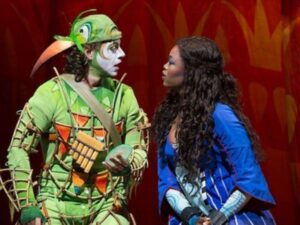
Why Do We love Mozart’s Papageno So Much?
By John Vandevert(PC: Met Opera/ Marty Sohl)
Happy April Fools from us at Opera Wire. This year, let’s take a look at what makes the crazy character Papageno from Mozart’s ‘The Magic Flute’ so captivating. What makes us love him? And why do we root for him?
Who is Papageno?
This beloved bird man, who is scared by everything but courageous when he needs to be, is from the opera of the Austrian composer and boy genius, get ready, Joannes Chrysostomus Wolfgangus Theophilus Mozart, or just Wolfgang Mozart for short. The Magic Flute is one of opera’s most beloved works and performed around the world every single year to packed crowds and praise by all walks of life.
Probably best known by its English name, The Magic Flute (or Der Zauberflöte), the opera features a timeless cast of magical characters like an Evil Queen who sings some of opera’s highest notes ever written, a dragon, a villain named Monostatos, child spirits, an enchanted flute, a temple of light, dark caves, and lots of transcendent music. Mozart’s opera was strongly influenced by Masonic philosophy and symbolism, and so Papageno represents the archetype of the Everyman.
In the face of danger, Papageno is scared but ultimately rises to the occasion, desires true love, has a difficult time telling the truth and following rules but ultimately cares for his fellow man without any stuffy egotism of the higher classes. Finding his love at last in the form of Papagena, he agrees to love her in her old woman form, proving that true love is based on inner goodness and not on physical appearance.
Why We Love Mozart’s Bird Man
Part of Papageno’s allure is that he represents every single person on Earth. We often find ourselves at the crossroads of happiness, sadness, fear, anger, alertness, and laziness. Depending on our mood and the situation, we can act in all sorts of strange and unexpected ways that seem contrary to our normal behaviour. However, under the façade of crazy displays, hilarious scenes of gorging food, and obstinance towards authority, Papageno means well.
We all desire to be kind to each other, to find true love, and to be with the ones we most care about. But life gets in the way, and when we watch someone like Papageno on the operatic stage, we are reminded of how non-linear life can be, how challenging trying to do the right thing can be, and how complex it is to stay on the path of virtue. Nothing is funnier than seeing the ups and downs of the human experience manifested on stage but Mozart was able to do that, and with such masterful results.
When Papageno and Papagena come together to sing about all the children they will have, this only comes after a brutal chain of trials which forces Papageno to transform almost completely. But he does and that’s what matters.
Three Fun Facts
Maybe you knew or didn’t know but here are three funny and interesting facts about our beloved Papageno!
1) The original Papageno, German impresario Emanuel Schikaneder, was a musical colleague with many famous Italian and German composers such as Antonio Salieri, Joseph Haydn, and Ludwig von Beethoven. He was also a quasi-composer, ‘Vestas Feuer’ his only attempt.
2) The famous Act 2 ‘Papageno–Papagena’ duet was actually inspired by the “Cucuzze cavatina” from colleague Antonio Salieri’s 1786 opera, ‘Prima la musica e poi le parole,’ or First the music and then the words.’
3) Papageno, in the context of the opera, was representative of the Catholic Church’s hold on the minds of the people. Papageno is subservient and submissive to the Queen, a symbol of the Church and its domination.


